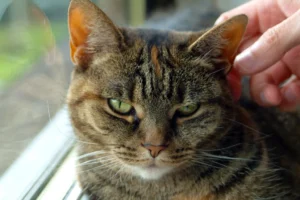Cats typically start spraying when they reach sexual maturity, which can vary depending on several factors such as breed and environment.
The reasons behind spraying
Cats start spraying for various reasons, but it often boils down to their natural instincts. Spraying is a way for cats to mark their territory, communicate with other cats, and even attract potential mates. It’s essential to recognize that spraying is not a behavior done out of spite or to annoy you; it’s simply a part of being a cat. Understanding these reasons can help you address the issue more effectively.
Early signs of spraying behavior
Keep an eye out for subtle signs that your cat may be gearing up to start spraying. Oftentimes, cats will start by sniffing around, exhibiting restless behavior, or even making small vocalizations before they begin spraying. If you notice any of these early signs, it’s crucial to take action promptly to prevent the behavior from becoming a habit. Being proactive can save you a lot of hassle in the long run.
- Increased scratching: If you see your cat scratching around doors and windows more frequently, it could be a sign that they are preparing to spray.
- Urine marking outside the litter box: If your cat suddenly starts urinating in different spots around the house, it may be a sign that spraying is on the horizon.
- Aggressive behavior: Cats can become more aggressive when they feel the need to mark their territory, so watch for any uncharacteristic hostility from your feline friend.
Extra tip: Consider providing additional vertical spaces for your cat, like cat trees or shelves, to encourage territorial marking in a more appropriate manner.
How to prevent spraying in cats
If you’re tired of finding mysterious puddles around your house, it’s time to take action to prevent your cat from spraying. One effective strategy is to have your furry friend spayed or neutered. This can reduce the urge to mark territory and prevent spraying behavior. Additionally, providing enough litter boxes in different areas of your home can help minimize spraying. So remember, one litter box per cat plus one extra is the golden rule!
Creating a calm and stress-free environment for your cat is crucial in preventing spraying. Make sure your feline friend has plenty of hiding spots, vertical spaces to climb, and engaging toys to keep them occupied. Cats often spray when they feel anxious or threatened, so ensuring they feel secure in their environment can go a long way in curbing this behavior.
Behavioral modifications to stop spraying
If your cat has already started spraying, don’t lose hope! There are several behavioral modifications you can implement to help stop this unwanted behavior. First and foremost, never punish your cat for spraying. This can make the problem worse and cause more stress for your pet. Instead, try using positive reinforcement techniques like treats and praise when your cat uses the litter box appropriately.
Another helpful tip is to clean up any sprayed areas thoroughly. Use an enzymatic cleaner specifically designed to break down the odor molecules left behind by cat spray. This will help deter your cat from returning to the same spot to spray again.
For a more hands-on approach, consider using pheromone diffusers or sprays. These products release calming pheromones that can help reduce stress and anxiety in your cat, potentially decreasing their urge to spray. Remember, patience is key when implementing behavioral modifications, so stay consistent and positive in your efforts to stop spraying.
Medical reasons for spraying
As cats age, they may start spraying due to medical reasons. Issues such as urinary tract infections, bladder stones, or even diabetes can lead to this behavior. It’s essential to consult your veterinarian if you notice your cat spraying, as they can help diagnose and treat any underlying medical conditions that may be causing it. In some cases, neutering male cats can also help reduce spraying behavior by decreasing their territorial instincts.
Environmental factors influencing spraying behavior
Cats can start spraying due to environmental factors. Changes in their environment, such as moving to a new home, the presence of other animals, or even a new roommate, can trigger spraying behavior. To address this, ensure your cat has plenty of resources like litter boxes, scratching posts, and hiding spots to help them feel secure. Creating a consistent routine and providing enrichment activities can also help reduce stress and prevent spraying.
Additional unique insight:
One effective way to deter spraying is by using pheromone diffusers. These products release calming pheromones that can help reduce stress and anxiety in cats, potentially decreasing the likelihood of them spraying in the home. Consider incorporating a pheromone diffuser in areas where your cat frequently sprays to help create a more calming environment for them.
Cleaning tips for sprayed areas
Dealing with the aftermath of a spraying cat can be quite the challenge. To tackle those unpleasant odors and stains left behind, start by blotting the affected area with paper towels to remove as much liquid as possible. Then, mix a solution of equal parts water and white vinegar to neutralize the odor. Be sure to test this on a small, inconspicuous area first to ensure it won’t damage your furniture or carpets. After applying the vinegar solution, sprinkle baking soda over the area and let it sit for a few hours to absorb any remaining odor. Finally, vacuum up the baking soda and voila! Your space should be smelling fresh once again.
Cleaning tip : Steam cleaning machines can also work wonders on eliminating lingering odors and stains from surfaces like carpets and upholstery.
Seeking professional help for spraying behavior
If your cat’s spraying behavior persists despite your best efforts, it may be time to seek professional help. A visit to the veterinarian is crucial to rule out any underlying medical issues that could be causing the behavior. Once medical concerns are addressed, a consultation with an animal behaviorist may be beneficial in developing a behavior modification plan tailored to your cat’s specific needs.
Remember, patience is key when dealing with spraying behavior. With the right support and guidance from professionals, you can prevent future incidents and ensure a harmonious living environment for both you and your feline friend.
Alex, a passionate animal lover, has experience in training and understanding animal behavior. As a proud pet parent to two dogs and three cats, he founded AnimalReport.net to share insights from animal experts and expand his knowledge of the animal kingdom.




